Search the Special Collections and Archives Portal
Search Results
Clark County Child Care Association (CCCA) Records
Identifier
Abstract
The Clark County Child Care Association (CCCA) Records (1957-1975) contain correspondence, fliers, dues paid rosters, insurance information, bills, memberships cards, and receipts. Also included are miscellaneous dues-related documents, minutes of CCCA (Nevada) general membership and executive board meetings, and a newsletter.
Archival Collection
Dennis Gomes Professional Papers
Identifier
Abstract
This collection has been removed from the University of Nevada, Las Vegas Libraries Special Collections and Archives' holdings by order of the Nevada Gaming Control Board. The collection was returned to the Nevada Gaming Control Board. Please contact special.collections@unlv.edu for further information.
The collection was comprised of photocopies of materials documenting investigations undertaken from 1973 to 1977 by Dennis Gomes, in his role as Nevada Gaming Control Board Division Chief and Law Enforcement Officer. The collection included investigative material on organized crime skimming at the Stardust, the Tropicana, and other Nevada casino-hotels.
Archival Collection
Mary Lytle Papers
Identifier
Abstract
The Mary Lytle Papers date from 1909 to 1968 and document Lytle’s experience as the first midwife in Overton, Nevada. The collection contains medical certificates, professional correspondence with Nevada Assistant State Archivist Frederick C. Gale, a handwritten memoir, and black-and-white photographs.
Archival Collection
Wanda Ball Moser Photographs
Identifier
Abstract
The Wanda Ball Moser Photographs depict Wanda Ball Moser and her family in Southern Nevada in the early-twentieth century. The photographs primarily depict Moser and her family at Mt. Charleston, Nevada or at home in Las Vegas, Nevada.
Archival Collection

Gene Noboru Nakanishi oral history interview: transcript
Date
Archival Collection
Description
Oral history interview with Gene Noboru Nakanishi conducted by Ayrton Yamaguchi, Cecilia Winchell, and Stefani Evans on April 2, 2021 for Reflections: The Las Vegas Asian American and Pacific Islander Oral History Project. Gene Nakanishi shares his detailed family history from both his father's and his mother's families. He discusses his paternal grandfather's work on the Union Pacific Railroad, the family's internment in Wyoming during World War II, and his father's release from the camp by joining the United States Army Signal Corps. Nakanishi also talks of his maternal grandfather who was of the Bushido ("warrior") class in Osaka, Japan, and his grandfather's work with Christian missionaries. He shares details of his mother's restaurant employment in Los Angeles and her opening of Osaka Japanese Bistro in Las Vegas in 1969. Nakanishi also talks about being born and raised in Las Vegas, his musical schooling at Berklee College of Music in Boston, and his graduate education at Harvard University. He discusses his work as a band teacher for the Clark County School District, his involvement in the Idyllwild Arts Summer Program band camp, and his interests in jazz music.
Text
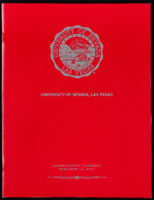
University of Nevada, Las Vegas (UNLV) Fall 2021 commencement program
Date
Archival Collection
Description
Commencement program from University of Nevada, Las Vegas Commencement Programs and Graduation Lists (UA-00115).
Text
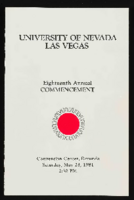
University of Nevada, Las Vegas (UNLV) 18th commencement program
Date
Archival Collection
Description
Commencement program from University of Nevada, Las Vegas Commencement Programs and Graduation Lists (UA-00115).
Text
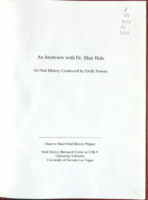
Transcript of interview with Blair Hale, by Emily Powers, June 16, 2006
Date
Archival Collection
Description
Text
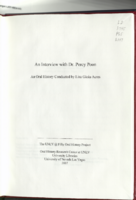
Transcript of interview with Dr. Percy Poon by Lisa Gioia-Acres, February 5, 2007
Date
Archival Collection
Description
Text
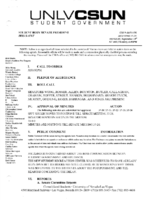
Meeting minutes for Consolidated Student Senate, University of Nevada, Las Vegas, September 10, 2007
Date
Archival Collection
Description
Text
